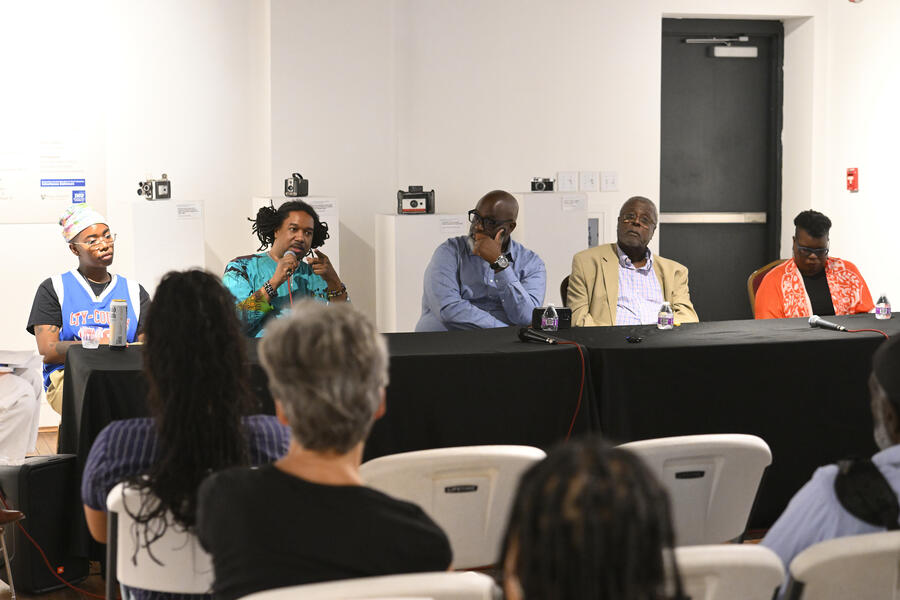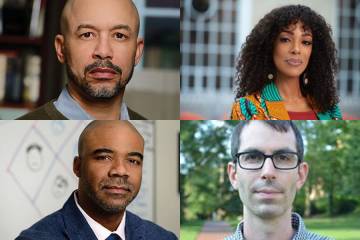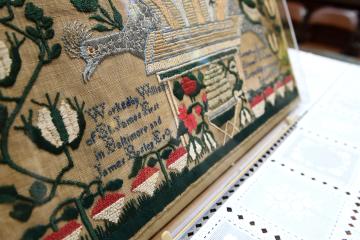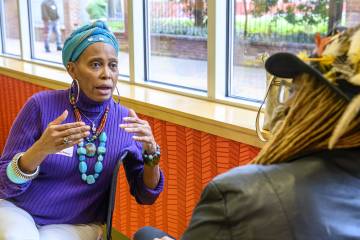When Inheritance Baltimore hosts its final conference in mid-November, it will be a showcase, celebration, and reflection of all the work the group has done over the past four years to harness the resources of the university to engage with and preserve Black Baltimore's history, culture, and arts.
Inheritance Baltimore and the Struggle for Just Futures: Cultural Work as Reparations will be held Nov. 14–16 in several Baltimore locations. Through panels, performances, and showcases, Inheritance Baltimore partners—both those internal to Hopkins and those in the community—will share highlights and lessons from the past four years.
Funded by the Mellon Foundation, Inheritance Baltimore (IB) includes the Krieger School's Billie Holiday Center for Liberation Arts and Chloe Center for the Critical Study of Racism, Immigration, and Colonialism; and the Sheridan Libraries Special Collections. The four-year, $4.4 million grant supported IB's three main goals: investigating the history of academic racism in higher education; bringing nontraditional knowledge, archives, and arts into the academic field of Africana studies; and redistributing resources from within the university to the community.
"It has been an awesome opportunity for us to think about reparative engagement and centering Blackness in a lot of spaces where it has not been uplifted and where it's currently being attacked," said Shawntay Stocks, IB's associate director of fellowships and community engagement. "These acts of censorship are on Black authors, diversity education and programming, writings on racism, and the silencing of how white supremacy operates within American society."
The conference's panels will reflect its three internal partners and the Black Baltimore cultural and religious organizations that have collaborated or partnered with IB. The event will feature a mix of research, practical application, and the arts.
For IB, the conference is like the proverbial Sankofa bird (in the Akan tradition), Stocks said—a mythical bird with its feet facing forward and its head turned back as a symbol of the power found in reflecting on the past in order to recognize future opportunities. With the grant ending, many of IB's activities will conclude, though some will continue. "We want to see how this can continue to live on in the community partnerships," Stocks said.
A sampling of IB's work over the past four years includes:
- Beats Per Minute: Exhibitions, a panel, and a performance celebrating the 50th anniversary of hip hop
- The annual Walk of Remembrance, which names and honors those who were enslaved on the Homewood campus
- Professional development for archivists, curatorial teams, doctoral students, postdoctoral fellows, and community members
- Ethel's Place: Celebrating Ethel Ennis, Baltimore's First Lady of Jazz, an exhibition at George Peabody Library exploring each era of the singer's life
- The Helena Hicks Emancipation School at Baltimore's Historic African American Churches, a monthly speaker series featuring Black scholars at Johns Hopkins
- Racism and Repair At and Beyond Johns Hopkins University, a public presentation of research into the ways academic departments at Hopkins both created racist forms of knowledge and expertise and were reshaped by anti-racist and desegregation struggles in the 20th century
- Nothing About Us Without Us: Storytelling as a Method for Community Organizing, a community-based learning course co-taught by professors, archivists, cultural curators, and longtime residents of Southwest Baltimore
- Arts and Social Justice Practicum, a course with local artists and scholars that used student-led artistic projects to explore the art and social justice of Baltimore and the Black Arts Movement
- Archival research with communities interested in documenting their histories and/or seeking historic designation
- Revolution in Our Lifetime: The Black Panther Party and Political Organizing in Baltimore, 1968-1973, an exhibit with Baltimore's Peale Museum
- Bearing Witness: Photographing Black Families in Baltimore, an exhibit at the Eubie Blake National Jazz Institute and Cultural Center
The conference will take place on the Homewood campus and at the Eubie Blake National Jazz Institute and Cultural Center, Baltimore Unity Hall, and the Reginald F. Lewis Museum of Maryland African American History and Culture. A full schedule is available on the Inheritance Baltimore website.
Posted in Arts+Culture, Community
Tagged community, inheritance baltimore











